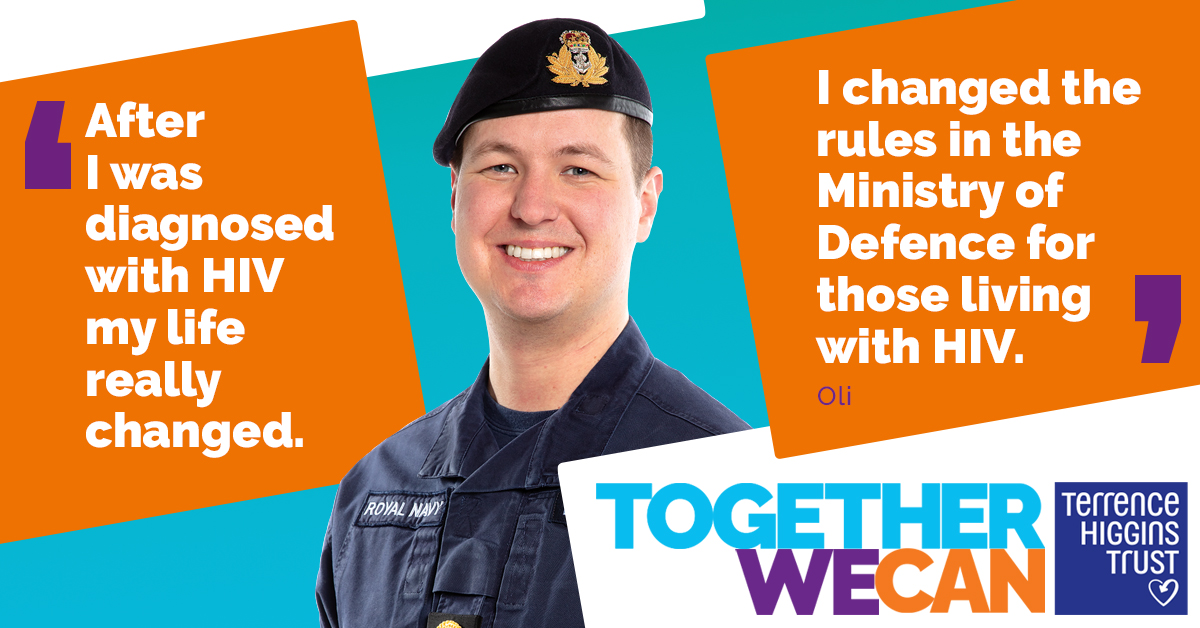
We work with our partners including the British HIV Association (BHIVA), the British Association for HIV and Sexual Health (BASHH), and NAT to tackle outstanding areas of discrimination faced by people living with HIV.
Ending the ban on people living with HIV joining the military
We worked with a member of the armed forces living with HIV to change military policy that barred people living with HIV from joining, and curtailed the careers of personnel diagnosed with HIV.
In December 2021 our campaign was a success with the Ministry of Defence announcing new policy that resulted in:
- A lifting of the ban on people living with HIV or people who are using PrEP joining the armed forces.
- An end to serving personnel living with HIV who have an undetectable viral load being automatically medically downgraded which means that they can now deploy alongside their units.
- A commitment to ensure that serving personnel – both in the UK and deployed overseas – have better access to HIV and broader sexual health prevention interventions.
The UK is now leading the way in this area, with only the Republic of South Africa having previously made these changes.
But there's one outstanding barrier which we are continuing to push on. Currently people are not able to fully serve in the military as aircrew or air traffic controllers if they are living with HIV. The Ministry of Defence has updated its policy on PrEP use for aircrew and controllers but this does not go far enough.
Changing the rules so people living with HIV can have full pilot licences
We worked with two pilots living with HIV to update out-of-date UK aviation policy that led to inconsistencies in how pilots living with HIV were treated-with some experiencing horrific treatment.
In June 2022, the UK Civil Aviation Authority (CAA) – the regulator body –announced changes that met all of our and the pilots’ demands and will directly benefit the lives and careers of pilots living with HIV.
We had four areas of concern that we pushed for change on:
1. Barriers to having a full career in aviation
Previously, pilots living with HIV were held back in their careers for no reason other than outdated policies. Pilots were limited in the medical licences that they could gain, which meant that the vast majority of pilots living with HIV were not able to achieve a licence that allowed them to fly solo – cutting off some jobs to them.
This has changed, with the CAA announcing that all pilots living with HIV are now able to work towards gaining a full medical licence (unrestricted UK Class 1 medical certification). There will now no longer be any limits with pilots being able to work towards any pilot role they wish in the aviation industry.
2. Lack of up-to-date guidance on HIV
Since a landmark change in 2018 that saw people living with HIV being able to train as pilots, there has been no up-to-date HIV guidance from the CAA for pilots. No clarity on what is expected of pilots, what the pathway is for gaining a medical licence, nor what medical tests they would need to undertake. This brought stress and uncertainty to pilots and resulted in inconsistency in the system on the way that pilots were treated.
After our work, the CAA released new guidance – written in partnership with BHIVA – to reflect the most up-to-date clinical HIV guidance. It clearly sets out the information that pilots living with HIV urgently wanted.
3. Impact of unnecessary neuro-psychometric testing
Previously, all pilots living with HIV were forced to do regular neuro-psychometric tests that pilots described as 'harrowing'. These tests weren't based on the up-to-date clinical evidence on HIV and pilots had to pay their cost themselves.
After out intervention, the CAA announced an end to mandatory neuro-psychometric testing for pilots living with HIV. The change will mean that no pilot living with HIV will now have to automatically do these tests. Instead, each pilot will be assessed individually, with a greater role in the process for HIV specialist doctors. This will mean that the vast majority of pilots will not need to do these harrowing and unnecessary tests in the future.
4. Treatment of pilots who retrospectively disclosed they were living with HIV
Previously, many pilots did not feel confident to share that they were living with HIV with a lack of trust in the system. We heard how this caused distress to the pilots themselves with the burden of 'keeping this secret'. Where a pilot did retrospectively disclose to the CAA that they were living with HIV they weren't supported; one pilot even receiving a threatening letter from the authorities when they disclosed.
This changed. The CAA announced it would be a 'compassionate regulator' and implemented a six month 'amnesty' for any pilots who shared that they were living with HIV.
If you're a UK based pilot or member of the armed forces who is still facing any barriers based on your HIV status, get in contact with us via [email protected].

